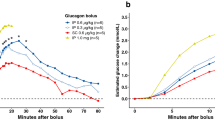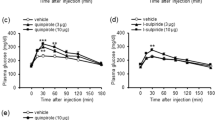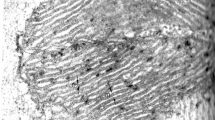Abstract
ALTHOUGH it is generally believed that the hyperglycæmia which follows the administration of epinephrine is due, at least in part, to hepatic glycogenolysis, attempts to demonstrate a direct effect of epinephrine on liver glycogen-levels have led to conflicting conclusions. In the rat, for example, Cori, Cori and Buchwald1 found that a decrease in liver glycogen occurred during the first 15 min after subcutaneous epinephrine injection, and considered this to represent a direct action of epinephrine on the liver. On the other hand, Sherlock2 found that portal veining infusions of epinephrine did not affect liver glycogen- or blood glucose-levels and concluded that the hormone did not exert a direct effect on hepatic glycogen metabolism of rats. We repeated and extended the experiments of Cori, Cori and Buchwald and also observed the transient hepatic glycogenolysis which they had described3. However, we presented evidence that this represented an indirect rather than a direct effect of epinephrine and suggested that it might be due to stimulation of endogenous glucagon release.
This is a preview of subscription content, access via your institution
Access options
Subscribe to this journal
Receive 51 print issues and online access
$199.00 per year
only $3.90 per issue
Buy this article
- Purchase on Springer Link
- Instant access to full article PDF
Prices may be subject to local taxes which are calculated during checkout
Similar content being viewed by others
References
Cori, G. T., Cori, C. F., and Buchwald, K. W., J. Biol. Chem., 86, 375 (1930).
Sherlock, S., Amer. J. Physiol., 157, 52 (1959).
Sokal, J. E., and Sarcione, E. J., Amer. J. Physiol., 196, 1253 (1959).
Sokal, J. E., Miller, L. L., and Sarcione, E. J., Amer. J. Physiol., 195, 295 (1958).
Miller, L. L., Sokal, J. E., and Sarcione, E. J., Amer. J. Physiol., 197, 286 (1959).
Miller, L. L., Bly, C. G., Watson, M. L., and Bale, W. F., J. Exp. Med., 94, 431 (1951).
Sokal, J. E., Sarcione, E. J., and Henderson, A. M., Endocrinology (submitted).
Unger, R. H., Eisentraut, A. M., McCall, M. S., and Madison, L. L., J. Clin. Invest., 41, 682 (1962).
Heiffer, M. H., Mundy, R. L., and Mehlman, B., Endocrinology, 69, 746 (1961).
Goldfien, A., Zileli, S., Despointes, R., and Bethune, J., Endocrinology, 62, 749 (1958).
Goldfien, A., Zileli, S., Goodman, D., and Thorn, G., J. Clin. Endocrin. and Metab., 21, 281 (1961).
Goldfien, A., Moore, R., Zileli, S., Havens, L., Boling, L., and Thorn, G., J. Clin. Endocrin. and Metab., 21, 296 (1961).
Cohen, G., Holland, B., Sha, J., and Goldenberg, M., J. Clin. Invest., 38, 1935 (1959).
Author information
Authors and Affiliations
Rights and permissions
About this article
Cite this article
SOKAL, J., SARCIONE, E. Failure of Physiological Concentrations of Epinephrine to affect Glycogen-levels in the Isolated Rat Liver. Nature 204, 881–883 (1964). https://doi.org/10.1038/204881a0
Issue Date:
DOI: https://doi.org/10.1038/204881a0
This article is cited by
-
Glycogen-laden hepatomegaly in diabetes
Diabetologia (1965)
Comments
By submitting a comment you agree to abide by our Terms and Community Guidelines. If you find something abusive or that does not comply with our terms or guidelines please flag it as inappropriate.



